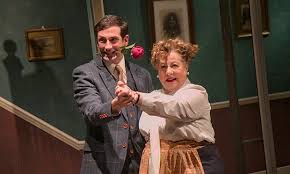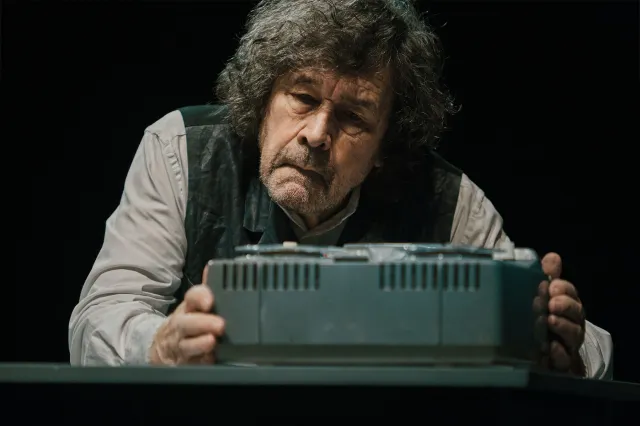Arcola Theatre
January is a tense month, isn’t it? Cold and tense. Everything seems portentous to the coming year. My first dinner out in 2024, my first run, my first breakdown, my first trip to the theatre. Speaking of, my first tumble on the boards is a resurrection of a long-forgotten Michael Hastings play.
Hastings’s work, although not obscure, has not travelled much past the millennium. Except for the premiere of his only unperformed play at the Southwark Playhouse in 2015, Cutting the Cloth, originally written in 1973. Despite two Emmys and BAFTAs, a Somerset Maugham award, poems, TV/Film adaptations, and an Oscar nomination in his day. It’s a cruel business what we call show.
Pumped full of excitement at witnessing the start of his career I ventured out in the cold. Pulled along by the subject matter of Jewish refugees to Brixton after the war, poignant and much neglected. The blurb promises a tale of precise social commentary. Sammy (Eddie Boyle’s debut) moves with much excitement into his father Leo (Paul Rider) and stepmother Shani’s (Nathalie Barclay) house after being raised by his grandmother in Croydon. This simple return to his family throws all the crockery in the air, and we are invited to watch it come thundering down.
Alex Marker’s set concertinas along the stretched studio 1. Downstage is a shabby living room. An invisible wall/door allows us to peer through into a landing, and hallway that snakes up to stage right and along to stage left. A carving knife through a London townhouse, carefully and cleverly cut.
Tenants bicker and nibble at one another, “characters” in the classic sense of the word bluster, and bash in and out of the cramped living room. Sammy’s thrown into a world of rotted love, mental illness, infidelity, and intergenerational trauma and is submerged at lightning speed.
Various actors meld the corpulent script into something resembling reality. Rider as Sammy’s alcoholic father Leo is one. A rambling, angry, and desperate man broken by having to flee his homeland (Hungary). Nicholas Day as the Rabbi brought in to try and straighten out the family’s woes has the mystic, and measured pace of a holy man. Sue Kelvin is the knees-up-mother-Brown landlady of yesteryear. Gossiping and tangoing in the hallway duster in hand, ready rebukes barked out at “them upstairs” who are late with the rent. A much-needed but swamped comic relief.
Along with very occasional flashes of comedy, the Rabbi’s scene: where the family and their neighbours share Challah bread and gefilte fish on sabbath is an excruciating but delightful domestic battle. Even loaned China, shop-bought delicacies, and a religious representative can’t stop Leo and Shani from ripping each other apart, complicated by upstairs neighbour Mrs. Pond’s (Alix Dunmore) unsettling delusional outbursts. We have all struggled through a dinner or lunch that seemed to be transported to hell and this is the only point where the characters make sense as a microcosm.
This however is the exception to the rule. Whether it is the frequent butchering of lines, the frigid blocking, or the text itself, the characters are shadow puppets, not people. One tone throughout, oppressive misery and allegory are leaped into so quickly and readily in each interaction, it has the feeling of theatrical speed dating. Tricia Thorn has a keen eye for dusting off neglected plays but her directing has characters regularly monologuing straight through walls. The interactions become unbelievable and the piece ricochets in emotional intensity.
Hasting’s play sits right in the angry-young-men era of British playwriting, in the same year as John Osborne’s seminal Look Back in Anger. Don’t Destroy Me’s frantic pace, and overloaded dialogue threatens to douse the story. The uninterrupted monologues, cyclical and repetitive content wear down our interest and willpower. The reality that Sammy is only in this house of mirth for a little over a week before he loses his religion, optimism, and sanity is a hard pill to swallow. The domino effect breakdowns and misty symbolism along with some shaky performances means that we fail to connect, being given few rays of hope. The characters are reeling from the unimaginable horrors of WW2, and unmitigated hopelessness is one of the play’s only lasting effects.



